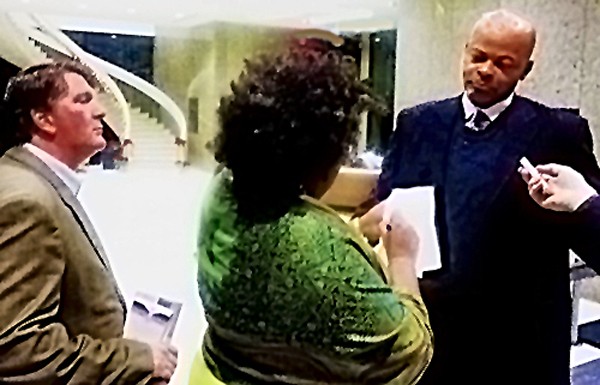The Shelby County Commission conducted its last meeting of the year on Monday and, in the process, put off until mid-January any decisions relating to two vexing matters — that of Robert Lipscomb’s proposed Tourist Development Zone (TDZ) project for the Fairgrounds and the supposedly dormant but still-simmering issue of rules changes.
The shelving of the TDZ plan was according to plan. Behind the scenes, key members of the commission, Democrats and Republicans, are working on a compromise version that can be presented to the state building commission.
 Jackson Baker
Jackson Baker
Lipscomb meets the press as Cooper-Young consultant David Upton looks on
A successful agreement could be presented as proof not only that the commission supports the TDZ, which is a city project that must be okayed by the state, but that Republican conservatives on the commission, whose counterparts dominate in the General Assembly, are among the plan’s chief supporters.
And things were moving swiftly toward such an agreement, with the GOP’s Heidi Shafer and the Democrats’ Reginald Milton taking leading roles in establishing a commission consensus that, in city planning czar Lipscomb’s words (echoing a title by thriller author Tom Clancy) would resolve “the sum of all our fears.”
Those fears, over the course of several public sessions and private negotiations, had involved three main points:
1) A concern by several commissioners, as well as county Mayor Mark Luttrell, that school funding be insulated from the flow of incremental sales tax revenue to the TDZ’s developmental fund. What is emerging is the concept of a voluntary “set-aside” of what would constitute the schools’ normal portion of incremental sales tax revenue generated within the TDZ.
That amount has been estimated to be as high as $1 million to $2 million annually by Republican Commissioner Steve Basar, who has long been a skeptic regarding the Fairgrounds TDZ (and Lipscomb projects in general) but whose resistance may be softening.
2) An insistence by GOP Commissioner (and former school board member) David Reaves and others that the city of Memphis, as the price of commission support, finally come across with monies long owed the county — notably the court-ordered “maintenance-of-effort” amount stemming from the city council’s decision in 2008 to withhold some $57 million in its customary annual payment to the Memphis school system.
That debt, which is now owed, post-school merger, to Shelby County Schools (SCS), has been the subject of negotiation between the city and SCS, and word is that the wangling principals are within a million dollars or so of a settlement in the general area of $40 million.
3) Guarantees against financial cannibalization by the TDZ — which envisions a combination of athletic facilities and retail enterprises at the Fairgrounds — of other prime commercial and sports areas.
Cases in point are the Cooper-Young and Overton Square shopping/entertainment areas, both of which are in the enlarged TDZ, and such existing athletic operations as Gameday Baseball and the burgeoning sports complex overseen by former University of Memphis basketballer Anfernee Hardaway.
Agreement in all these problem areas by a bipartisan commission majority encompassing both urban and suburban areas is near. It is still far enough away, however, as to ensure slam-dunk passage of a motion to defer action until the January 15th commission meeting. The motion was made formally by Democratic Commissioner Eddie Jones, whose District 11 is directly affected by the proposed TDZ.
On hand Monday to audit proceedings was Lipscomb, who chatted with reporters after the commission’s deferral vote, pointing out that, while commission action on the TDZ was not, strictly speaking, necessary, it would enhance the proposal’s prospects for approval by the state building commission.
Lipscomb welcomed the month-long delay by the commission, saying, “It’s worth taking the time to do things right.”
• The other matter deferred by the commission until January 15th came after a surprise motion by Democrat Walter Bailey to revisit the issue of a rules change for the commission that would basically establish a majority-vote rule for all pending matters, including several that currently require a two-thirds majority vote.
Bailey’s motion was something of a surprise because the commission appeared to have decided on remanding the rules-change issue to an ad hoc committee as one aspect of an agreement to dismiss a lawsuit on the matter brought against Chairman Justin Ford by seven commission members.
The suit had been prompted by Ford’s persistence in rejecting an agenda proposal for the aforementioned rules change from Commissioner Basar. The context of that had been the newly elected commission’s reorganization vote in September, in which Basar, last year’s vice chair, had been denied the chairmanship by a majority vote on behalf of Ford. Though nominally a Democrat, Ford has often joined ranks with the commission’s Republican minority and enjoyed GOP support for the chairmanship.
The bad feeling that persisted from that occasion resulted in a seven-member coalition, comprised of Basar and six Democrats, that challenged Ford’s prerogatives as chairman and, in the judgment of Ford’s Republican supporters, may have also contemplated deposing Ford as chairman.
The objecting members sued Ford in Chancery Court for violation of commission rules in his handling of agenda matters, but Chancellor Jim Kyle ruled that the new commission had not formally adopted rules and needed to do so. In the wash of all that came a compromise agreement in which Ford’s tenure was guaranteed and the rules-change matter was referred to the aforesaid ad hoc committee, which has not yet been activated.
Bailey noted that fact in making his motion to reprise the rules-change matter, but the long and the short of it all was that action was deferred on the matter when Democrat Van Turner, who with Bailey had been co-counsel in the seven commissioners’ lawsuit, called for adherence to the ad hoc committee solution as a matter of good faith.
“We’re all friends here,” said the GOP’s Terry Roland, who, with Shafer, had spoken against Bailey’s motion.
Turner himself will apparently serve as chairman of the ad hoc committee, which presumably will meet and report by the January 15th date.
• Among the other matters dealt with by the commission on Monday was a $14.5 million TIF (tax increment financing plan) to finance the creation of a hotel in the Graceland area. Bailey challenged the plan as “a bad investment [that] could go south,” and one that should have been handled under private auspices.
Bailey asked “who, besides the taxpayers” would be responsible for retiring the bonds on the project if expected proceeds fell short.
James McLaren, attorney for Elvis Presley Enterprises (EPE), assured that EPE would be responsible for any shortfall, and the commission gave its approval to the plan by a 9-1 vote.
(This week’s Flyer “Viewpoint,” by businessman Taylor Berger, p. 17, provides a less than favorable view of both the Graceland proposal and the Fairgrounds TDZ.)
• The local political component of the Christmas season got under way with holiday parties sponsored by the Democratic and Republican parties of Shelby County. Whatever the ratio of political support claimed by the two parties, they managed to provide equally festive occasions.
The Shelby County Democrats’ official party took place last Thursday night, simultaneously with two candidate events related to the forthcoming 2015 city election season.
Councilman Edmund Ford Jr., a candidate for reelection, was the beneficiary of a well-attended fund-raiser at the river-bluff residence of Karl and Gail Schledwitz. Architect Chooch Pickard, who is considering a run for the council, held a preliminary meet-and-greet at the Jay Etkin gallery on Cooper.
Pickard, who espoused a preservationist platform, said he was meditating on a candidacy for the District 5 seat now held by Jim Strickland, if Strickland should run for mayor. Crowd-wise, he undoubtedly benefited from the fact that his event was held just prior to, and next door to, the Democrats’ party at Alchemy.

 Greg Cravens
Greg Cravens 
 Jackson Baker
Jackson Baker